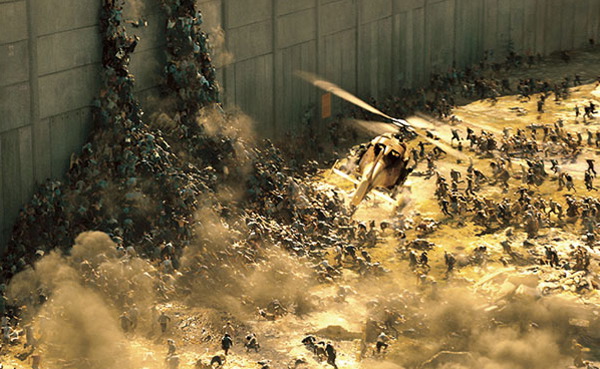Culture
“World War Z” an apocalypse unto itself

World War Z
dir. Marc Forster
Release Date: Jun 21, 13
- 1
- 2
- 3
- 4
- 5
- 6
- 7
- 8
- 9
- 10
It was never going to be easy to adapt Max Brooks’ 2006 blockbuster of a novel, World War Z. The tomb reads like a blood-splattered FBI report, the sort written by Special Agent Fox Mulder or Dana Scully at the end of an episode of The X-Files. The locations are vast, the details meticulous, and the situations take precedence over any character. An apt translation to the silver screen required the expansive finesse that Steven Soderbergh and Stephen Gaghan exhibited on 2000’s Traffic. Instead, Quantum of Solace director Marc Forster and The Kingdom screenwriter Matthew Michael Carnahan took a stab at the savory chunk of meat, resulting in an overcooked dish that wouldn’t taste good with a bottle of A1 and a prescription of Thorazine.
In terms of storyline, it’s best to describe it the way Forster or Carnahan might have explained the book two years ago to producers: Zombie virus starts infecting the world. Hollyhood hunk-turned-United Nations employee Brad Pitt has to save the day as the world crumbles. Things go boom and stuff falls down as Pitt travels to and from different countries. It’s like CNN’s The Situation Room meets The Walking Dead. Capiche?
What’s agonizing about Forster’s World War Z is its attempts to sell itself as a sophisticated piece of filmmaking, something separate from the atypical horror genre that birthed classics like George A. Romero’s Night of the Living Dead or its cult masterpiece of a sequel, Dawn of the Dead. Gnawing on Wikipedia-sourced studies of each country and moaning through mild discussions on race and culture doesn’t make for a “smart zombie film.” As Pitt’s soulless character travels through South Korea, or Israel, or Wales, the film tires in its pursuit towards intelligence, eventually succumbing to cliche horror tropes and situational tension that wouldn’t even cut it on a PS3 game.
Though, that’s exactly what it feels like: a video game. Save for a total of, maybe, 12 minutes of drama, most of it leaking with tacky exposition from Pitt’s children (e.g. “What’s martial law, daddy?,” “Do you miss your old job, daddy?,” “When are you going to have your government friends help us off this roof, daddy?,” okay, that last one is fake), the film’s other 104 minutes act as quick shots of adrenaline that keep the heart beating and the mind feeling like an idiot. Pitt feels less like a hero and more like a plasticized version of the popular video game hero Nathan Drake (of Uncharted), whose sole purpose is to run, jump, punch, and survive commercial plane crashes. Seriously, if anyone thought the action in Man of Steel was over-the-top, well, apparently it’s just being amplified each weekend this summer.
If this review feels unfair to Forster, here’s my reasoning: Quantum of Solace. All of the problems that plagued Daniel Craig’s second Bond entry scream throughout Z. Characters act only to push a weak, action-based storyline, while plotting breathes very little because so much of it is spent searching for the next flashy sequence. Forster treats his audience like a rattled, Surge-fueled eight-year-old gamer, aching to reach the next kaboom and wazoo, even if it means skipping through the crucial FMV sequence. Basically, in five years, the director hasn’t learned anything from his mistakes.
It wouldn’t be such a disappointment if the subject matter wasn’t so celebrated. Brooks’ novel was a bold reinvention of the zombie genre, an attempt to reconceptualize Romero’s work as a vivid, realistic piece of nonfiction. It felt real on the pages and read with such intelligence that to see such a bullshit capitalization of the source material is not only a missed opportunity, but an insult to the readers that championed the novel for years. This one’s going overboard, but I find it almost impossible to believe Brooks walked out of any screening of this, pulled out his cell, and texted, “Pops, they did it! It’s genius!” Not even if he was on thorazine.
Towards the film’s chaotic middle, there’s a moment where James Badge Dale realizes he’s been bit after killing a zombie. (Whatever, this movie is spoiler-proof.) Before he blows his brains out, he mutters some asinine cliche along the lines of “I got this.” I’ll give it to the screenwriters: it was the only time I ever disagreed with the suicide of a character. Instead, Dale should have turned, if only so he could massacre Pitt and save us from any abhorrent sequels that are sure to come. Christ, what a stupid movie.